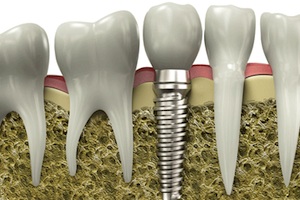Missing teeth are often just ignored -why bother? There are still all the others around to assume the necessary functions! The truth is different: missing teeth can affect us in the way we eat, speak, rest, and appear. They can influence our behavior and overall functioning. A missing tooth can also compromise the dental health of its neighbor.
In the past the only options for missing teeth was either dental bridges or dentures. Bridges and dentures still have their place now, but the benefits for dental implants are significant.
-They help to preserve remaining natural bone structure.
-They reduce the need to cut out adjacent teeth for a bridge.
-They eliminate the need for removable partials or dentures and the sores that may go along with them.
-The roof of the mouth does not need to be covered by removable partials or complete dentures.
-They look, feel and work just like natural teeth.
-They support face shape, smile and provide confidence when eating and speaking.
-A few exceptions apply: people who smoke and people who have diabetes, particularly when uncontrolled and severe, have much less success with implants, as healing is impaired. However, you may consider quitting smoking and diabetes may be able to be controlled better with the help of a specialist. Other patients who have pacemakers, artificial heart valve replacements or other implanted devices may have to stay away from implants and they may have to stick to more conventional methods such as bridges and dentures.
The dentist will do a thorough examination to decide, whether you are a candidate for dental implants. Each tooth will be examined and a medical and dental history will be taken. Special x-rays (panoramic and tomograms) are needed to determine whether there is enough bone available. This helps to decide whether the implants can be placed directly, or whether grafting more bone will be necessary. This step is very important. It also helps the dentist to identify important structures, like nerves, sinuses and adjacent tooth roots. You will discuss all the treatment options with your dentist, which also helps to clarify expectations about the final results. This comprehensive treatment plan can be compared to building the foundation of a house. The foundation has to be solid, so the final structure holds up. A properly done dental implant should be a one-time job.
The procedure itself is done in the dental office or in a surgical suite under a local anesthetic, and over-the-counter pain medication may be needed after the surgery. The time it takes to heal can be variable. It may take up to six months, but it is important that healthy bone develop around your implant, which is the strong bond that is needed to hold the implant in place. Once the healing is complete, your dentist takes a final impression, which is needed by the dental laboratory to create the permanent teeth.
Once the permanent teeth are placed you will receive care and a dental hygienist will instruct you in dental hygiene. Special plastic cleaning instruments are used to avoid scratching the titanium surface of the implant. Just as with natural teeth, implant-retained teeth need to be cleaned daily and need to be regularly checked by a dentist.
Looking at the overall picture it is clear, that the dental health and function of our teeth closely relates to every facet of our overall health, from speech to the function of our digestive tract and proper nutritional status, which affects cardiovascular health as well. A tooth implant involves a lot of detail work and effort, but its benefits are far reaching.
Reference: Family Health, Vol. 21, No.2, Summer 2005 (June), page 9-13; published by The College of Family Physicians of Canada
Other links re dental implants:
Association of Prosthodontists of Canada
American College of Prosthodontists
Last edited December 7, 2012






